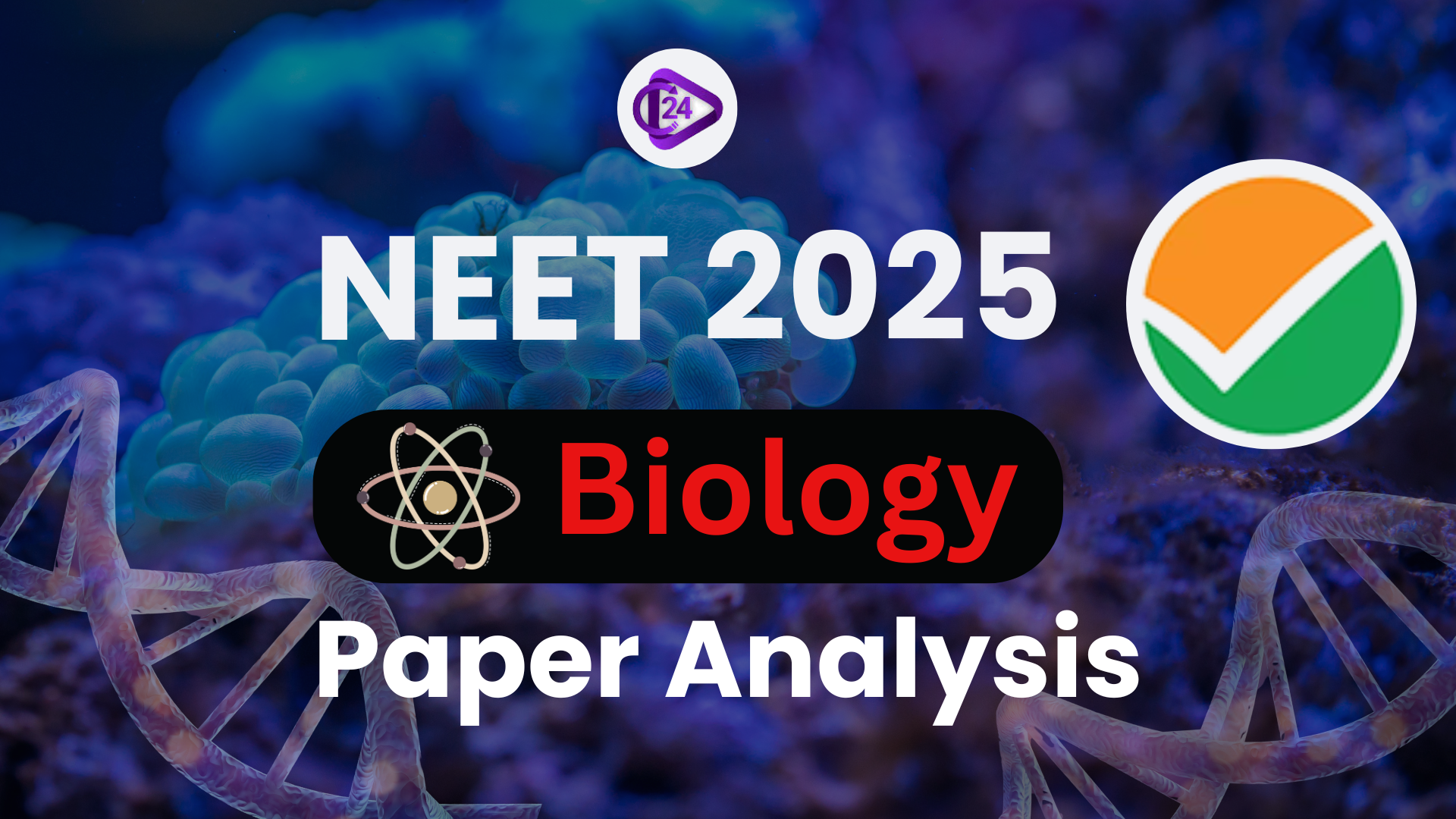Daily Quizzes
Mock Tests
No tests attempted yet.
Select Category
Get in Touch with Class24 for All Your Needs!
NEET 2025 Biology Paper Analysis is a must-read for aspirants seeking to analyze their performance, considering the updated pattern and trends of the examination. Since Biology is one of the most scoring sections in NEET, it is necessary to analyse the paper to know the topics that carry maximum weight and how difficult the question paper was. The exam was conducted on May 4, 2025, with over 22 lakh candidates fighting for a place in India's top medical colleges. The questions in the Biology paper were both familiar and tricky, which mainly followed the NCERT curriculum. The paper was also challenging for the knowledge level and time management of the aspirants.

In NEET 2025 Biology Paper Analysis, let us learn how question distribution was in this chapter, how difficult the paper was, and which strategies worked best for the students. Reviewing how the paper was structured as well as which topics came up most in the paper, allows one to fine-tune one’s study strategy for future exams. The result analysis is not only for those who appeared for the exam but also for those who will be appearing in future years to know what to expect in Biology in NEET.
Overview of NEET 2025 Biology Paper
The NEET 2025 Biology paper consisted of 90 multiple-choice questions consisting of equally divided between Botany and Zoology. The exam was of moderate difficulty, with easy, medium, and difficult questions evenly spread out across both sections. Most of the questions were from the NCERT syllabus, however, it focused on application and concept rather than rote learning. The goal of this approach was to evaluate students' depth of knowledge and analysis skills. The goal of the paper was not simply to have the kids memorize the material; it was to test their understanding and application skills.
NEET 2025 Biology Paper Details
| Aspect | Details |
|---|---|
| Total Questions | 90 (45 Botany + 45 Zoology) |
| Difficulty Level | Moderate |
| Question Types | Single-choice MCQs, Assertion and Reason, Match the Column, Multi-statement questions, Diagram-based questions |
| Class-wise Distribution | Botany: 51% from Class 11, 60% from Class 12; Zoology: 44% from Class 11, 44% from Class 12 |
| Conceptual Focus | Emphasis on application-based questions requiring a deep understanding of concepts |
Key Highlights of NEET 2025 Biology Paper
The NEET 2025 Biology paper was balanced between Botany and Zoology questions. The paper was based on the NCERT curriculum and consisted of a collection of questions like assertion, reasoning, and diagram-based questions. The questions were between easy to challenging, and the difficulty level was moderate. However, it was also noted that more application-based questions were asked, especially in Genetics, Ecology, and Human Physiology. Additionally, the ability to apply concepts to solve problems was also focused on, as well as conceptual clarity. Consequently, theoretical knowledge as well as practical understanding had to be the focus of students.
NEET 2025 Biology Paper Highlights
| Aspect | Details |
|---|---|
| Total Questions | 90 (45 Botany + 45 Zoology) |
| Question Types | MCQs, Assertion-Reason, Match-the-Column, Multi-statement, Diagram-based questions |
| Difficulty Level | Moderate |
| Focus Areas | Genetics, Molecular Biology, Ecology, Human Physiology |
| Chapter Emphasis | Genetics and Evolution, Plant Physiology, Ecology and Environment, Human Physiology and Health |
| Types of Questions | Concept-based, problem-solving, and diagram-based |
Chapter-Wise Analysis of NEET 2025 Biology
The NEET 2025 Biology paper consisted of a total of 90 questions, 45 each from Botany and Zoology. On analysis of chapter-wise distribution, we notice that some of them have more weightage, which signifies their importance in the exam. Topics emphasized in Botany included Genetics and Evolution, Plant Physiology, and in Zoology, Human Physiology, Human Reproduction, and Animal Kingdom. The reason that these high-weightage chapters should be given importance in preparations for the upcoming exams is substantiated through this distribution.
NEET 2025 Chapter-wise Distribution of Questions
| Chapter | Average Questions | Weightage (%) |
|---|---|---|
| Genetics and Evolution | 15 | 24% |
| Ecology and Environment | 10 | 16% |
| Plant Physiology | 8 | 13% |
| Plant Diversity | 7 | 12% |
| Cell Structure and Function | 6 | 10% |
| Plant Reproduction | 5 | 9% |
| Morphology of Flowering Plants | 4 | 7% |
| Plant Anatomy | 2 | 4% |
| Biomolecules | 2 | 3% |
| Biology in Human Welfare | 1 | 2% |
| Human Physiology | 13 | 45% |
| Human Reproduction & Reproductive Health | 5 | 18% |
| Animal Kingdom | 3 | 10% |
| Origin & Evolution | 3 | 10% |
| Human Health & Diseases | 3 | 9% |
| Animal Tissue | 1 | 3% |
| Animal Husbandry | 1 | 3% |
| Structural Organisation in Animals | 1 | 2% |
Important Topics to Focus on for NEET 2025 Biology
Biology is a top section for NEET 2025 as it is 50% of the total marks for the exam. The strategy is to study more highly weighted chapters that have come up in previous times in exams. Genetics and Evolution, Ecology and Environment, Plant Physiology (in Botany), and Human Physiology, Human Reproduction, and Biotechnology (in Zoology), are chapters in Botany and Zoology, respectively. If you have a good grasp of these topics, it will help with your conceptual clarity, and you will perform better in the exam. Traditionally, diagram-based questions can help with better time management and application of knowledge, and practicing answers from previous years' papers will also prove beneficial.
NEET 2025 Chapter Importance
| Chapter | Subject | Importance |
|---|---|---|
| Genetics and Evolution | Botany | High weightage; includes topics like Mendelian genetics, genetic disorders. |
| Ecology and Environment | Botany | Emphasizes ecosystem dynamics, biodiversity, and conservation. |
| Plant Physiology | Botany | Covers plant growth, transport, and photosynthesis. |
| Human Physiology | Zoology | Focuses on digestion, circulation, excretion, and neural control. |
| Human Reproduction | Zoology | Includes reproductive health, gametogenesis, and hormonal control. |
| Biotechnology and Its Applications | Zoology | Covers genetic engineering, applications like BT cotton, and gene therapy. |
Difficulty Level of NEET 2025 Biology
The NEET 2025 Biology paper was more or less of moderate difficulty. For most of the questions, it was based on the NCERT syllabus, but a few questions were a slightly twisted version, which made you think deeper to get the concept of the question. The Biology section was especially long this year, with students saying that the time limits were a real obstacle. The paper had an appropriate mix of factual recall and questions based on application, with assertion reasoning and diagram questions. Despite becoming much longer and complex, the Biology section remained one of the more manageable sections of the NEET UG 2025 exam.
NEET 2025 Difficulty Level Analysis
| Subject | Easy | Medium | Hard | Grand Total |
|---|---|---|---|---|
| Botany | 19 | 16 | 14 | 49 |
| Zoology | 19 | 16 | 6 | 41 |
| Overall Difficulty Level | 38 | 32 | 20 | 90 |
Strategies for NEET 2025 Biology Preparation
A well-structured preparation strategy is required to do good in the NEET 2025 Biology section. With Biology being a major part of total marks, it is important to have a proper understanding of concepts, manage time, and practice consistently. Begin by going through the NCERT textbooks well, as they’re the basis of the board exam! You need to prioritize high-weightage chapters and don’t forget about smaller topics. By regular revision, solving previous year papers, and taking mock tests, you would get used to the pattern of the exam and learn to time yourself better. Furthermore, practice getting a good grasp of diagrams since they are a common part of the exam.
- Master NCERT Textbooks: Focus on understanding concepts from NCERT, as most questions are directly derived from these books.
- Prioritize High-Weightage Chapters: Give extra attention to Genetics, Ecology, Human Physiology, and Biotechnology.
- Regular Revision: Consistently revise topics to ensure retention of concepts and facts.
- Practice with Previous Year Papers: Solving past year papers will help you get familiar with the exam format and question types.
- Focus on Diagrams: Diagram-based questions are common; practice labeling and understanding their concepts thoroughly.
Conclusion
It is concluded that the NEET 2025 Biology paper was moderate in difficulty and gave students a chance to demonstrate their grasp of the basic concepts as well as apply the same in problem-solving scenarios. Students can maximize their performance in this section by concentrating on high-weightage chapters, practicing regularly, and managing time simultaneously. In addition, the mix of easy, medium, and hard questions in the paper highlights the need to go beyond just easy questions in your preparation strategy. As NEET approaches 2025, achieving success in this exam completely requires the correct techniques and a continued schedule.














Your email address will not be published. Required fields are marked *